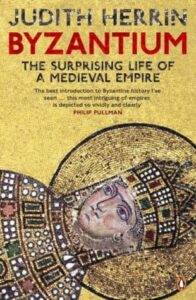 Byzantium, Judith Herrin
Byzantium, Judith Herrin
This is clearly a labour of love: Herrin knows her stuff, and is trying to communicate it to a broader audience. Sometimes this results somewhat in insulting the general reader’s intelligence, and yet at other times she gets deep into minutiae rather than covering the stuff that might really interest people — like the role of mutilation (instead of assassination) in political takeovers. I wanted a lot more of that, and yet this one review explains it much more thoroughly. And yes, that’s a very brief explanation, but it’s more than Herrin did.
Byzantium is a fascinating empire, and we do owe more to it than we often believe. Rome dominates our thoughts, both in religion and in history — especially in Britain, of course, since we were ruled by Romans and then our entire state religion is based on a reaction to Roman Catholicism. But Byzantium has much to teach us about the European past as well.
Herrin definitely has a bias toward Constantinople and their way of worshipping and… just about everything. At times, an apparent hostility to Roman Catholicism breaks through, which is rather odd from a scholar (and yet, might have made the book more interesting if it were a bit more apparent — you have to choose which way to go, and make it clear).
Interesting read, but does get a bit bogged down in details and repetitive.

I’ve had this on my TBR for over 10 years now, I think. I read John Julius Norwich’s trilogy and Graves’s Belisarius and a good friend bought me Byzantium and a couple of Tom Holland books as a birthday present. I waltzed through the Hollands and never got round to Byzantium. Now… I feel less guilty about that. Thank you 😉 I may yet get to it eventually!
imyril recently posted…Redux: April is running up that hill
How were John Julius Norwich’s books? I’ve thought about picking those up!